International Management Report: ZARA's Global Workforce and Policies
VerifiedAdded on 2020/07/23
|7
|2101
|51
Report
AI Summary
This report provides a critical analysis of ZARA's international management practices. It begins with an introduction to international management and its significance in today's global business environment. The report then delves into the role of leadership, emphasizing the importance of cross-cultural communication, collaboration, and adaptability for global leaders. It examines the role of culture in international business, highlighting its impact on communication, cultural trends, and the need to understand diverse markets. The report also addresses the challenges and opportunities in managing a global workforce, including workforce planning, cost control, and human capital management, particularly in the context of ZARA's expansion. Furthermore, it explores various factors and ethical international policies, such as corporate governance, sustainable business practices, and corporate social responsibility, all crucial for multinational corporations. The report concludes by summarizing the key findings and emphasizing the importance of international management for business success. The report references various academic sources to support its analysis.
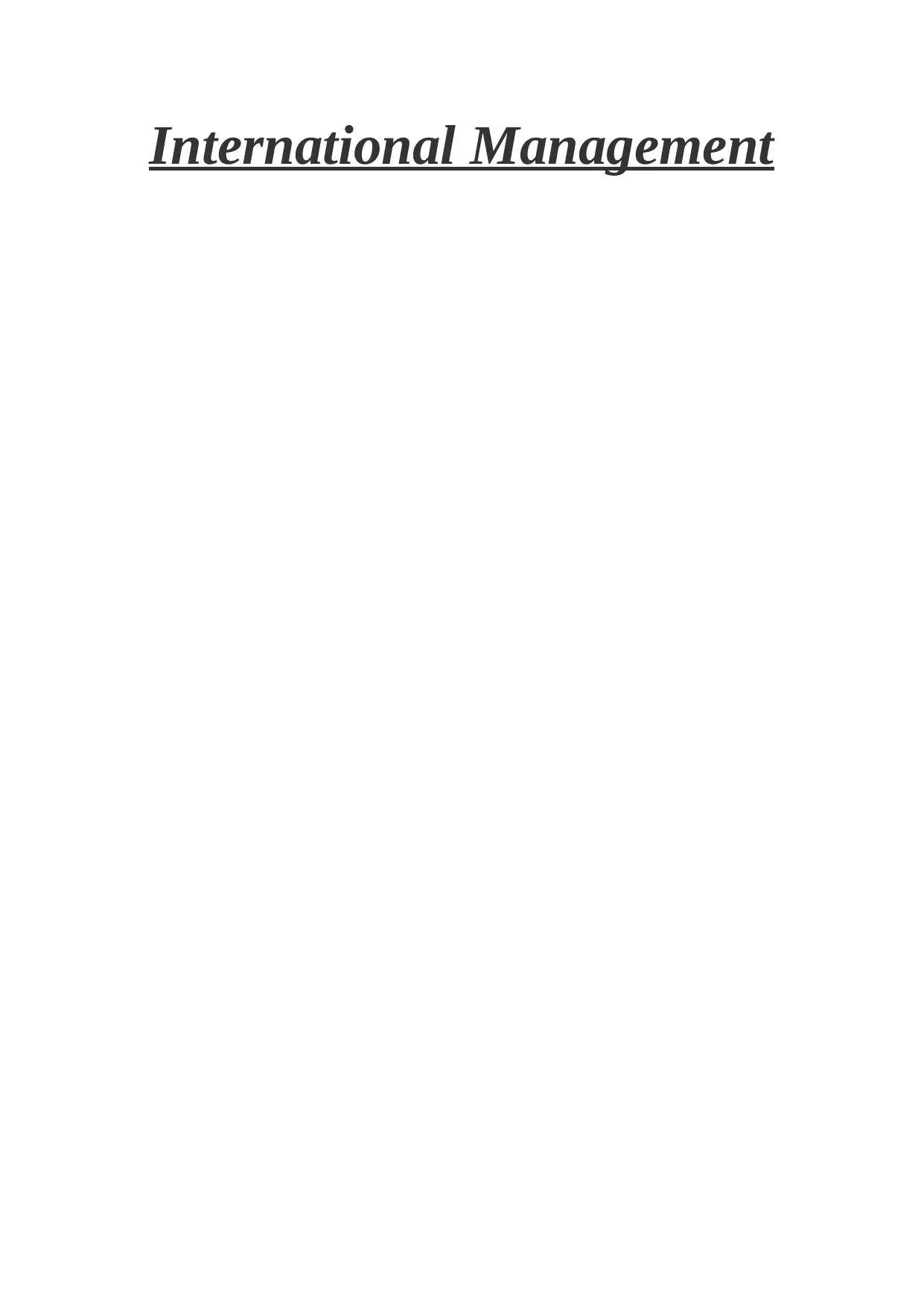
International Management
Paraphrase This Document
Need a fresh take? Get an instant paraphrase of this document with our AI Paraphraser
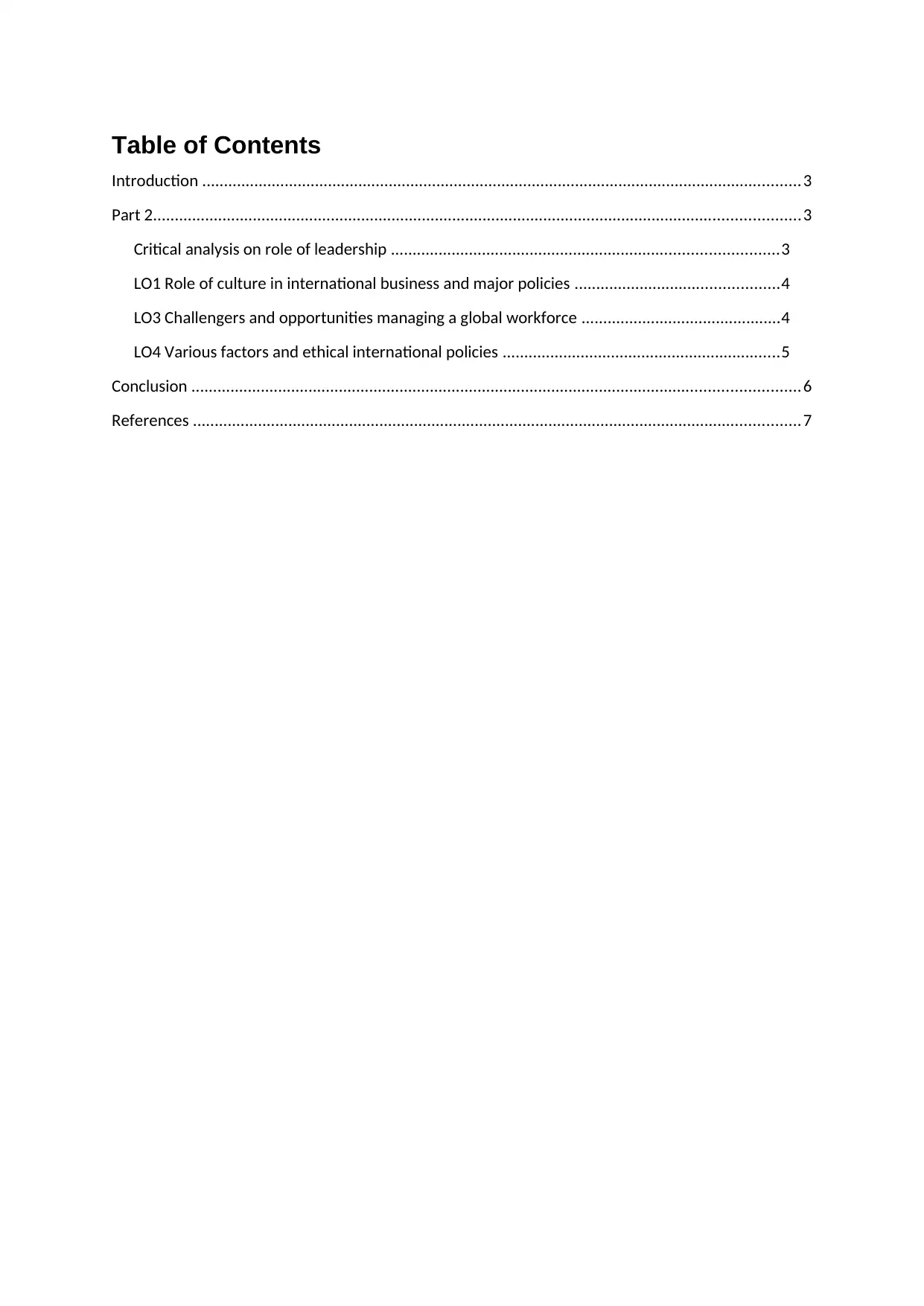
Table of Contents
Introduction ..........................................................................................................................................3
Part 2.....................................................................................................................................................3
Critical analysis on role of leadership .........................................................................................3
LO1 Role of culture in international business and major policies ...............................................4
LO3 Challengers and opportunities managing a global workforce ..............................................4
LO4 Various factors and ethical international policies ................................................................5
Conclusion ............................................................................................................................................6
References ............................................................................................................................................7
Introduction ..........................................................................................................................................3
Part 2.....................................................................................................................................................3
Critical analysis on role of leadership .........................................................................................3
LO1 Role of culture in international business and major policies ...............................................4
LO3 Challengers and opportunities managing a global workforce ..............................................4
LO4 Various factors and ethical international policies ................................................................5
Conclusion ............................................................................................................................................6
References ............................................................................................................................................7
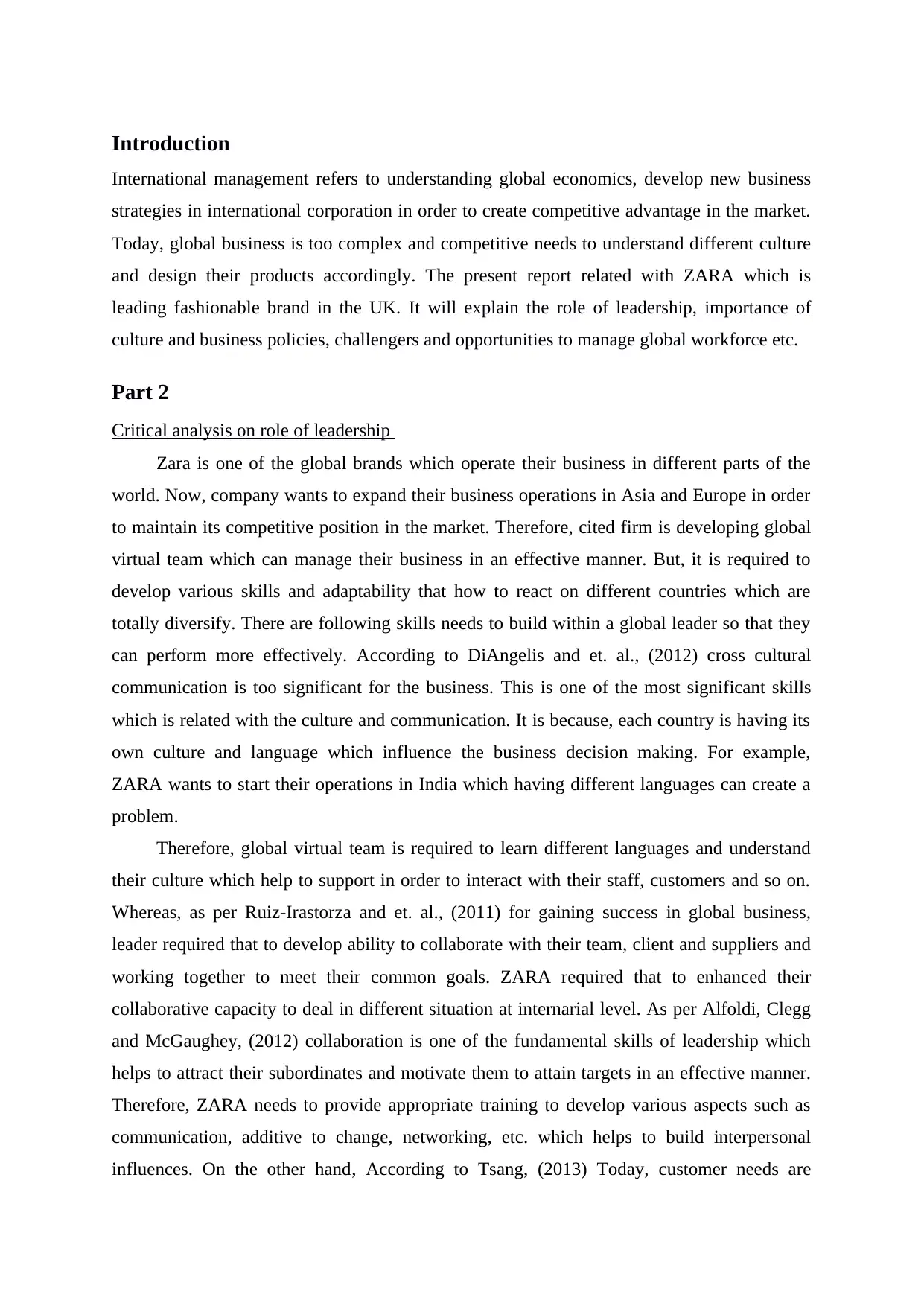
Introduction
International management refers to understanding global economics, develop new business
strategies in international corporation in order to create competitive advantage in the market.
Today, global business is too complex and competitive needs to understand different culture
and design their products accordingly. The present report related with ZARA which is
leading fashionable brand in the UK. It will explain the role of leadership, importance of
culture and business policies, challengers and opportunities to manage global workforce etc.
Part 2
Critical analysis on role of leadership
Zara is one of the global brands which operate their business in different parts of the
world. Now, company wants to expand their business operations in Asia and Europe in order
to maintain its competitive position in the market. Therefore, cited firm is developing global
virtual team which can manage their business in an effective manner. But, it is required to
develop various skills and adaptability that how to react on different countries which are
totally diversify. There are following skills needs to build within a global leader so that they
can perform more effectively. According to DiAngelis and et. al., (2012) cross cultural
communication is too significant for the business. This is one of the most significant skills
which is related with the culture and communication. It is because, each country is having its
own culture and language which influence the business decision making. For example,
ZARA wants to start their operations in India which having different languages can create a
problem.
Therefore, global virtual team is required to learn different languages and understand
their culture which help to support in order to interact with their staff, customers and so on.
Whereas, as per Ruiz-Irastorza and et. al., (2011) for gaining success in global business,
leader required that to develop ability to collaborate with their team, client and suppliers and
working together to meet their common goals. ZARA required that to enhanced their
collaborative capacity to deal in different situation at internarial level. As per Alfoldi, Clegg
and McGaughey, (2012) collaboration is one of the fundamental skills of leadership which
helps to attract their subordinates and motivate them to attain targets in an effective manner.
Therefore, ZARA needs to provide appropriate training to develop various aspects such as
communication, additive to change, networking, etc. which helps to build interpersonal
influences. On the other hand, According to Tsang, (2013) Today, customer needs are
International management refers to understanding global economics, develop new business
strategies in international corporation in order to create competitive advantage in the market.
Today, global business is too complex and competitive needs to understand different culture
and design their products accordingly. The present report related with ZARA which is
leading fashionable brand in the UK. It will explain the role of leadership, importance of
culture and business policies, challengers and opportunities to manage global workforce etc.
Part 2
Critical analysis on role of leadership
Zara is one of the global brands which operate their business in different parts of the
world. Now, company wants to expand their business operations in Asia and Europe in order
to maintain its competitive position in the market. Therefore, cited firm is developing global
virtual team which can manage their business in an effective manner. But, it is required to
develop various skills and adaptability that how to react on different countries which are
totally diversify. There are following skills needs to build within a global leader so that they
can perform more effectively. According to DiAngelis and et. al., (2012) cross cultural
communication is too significant for the business. This is one of the most significant skills
which is related with the culture and communication. It is because, each country is having its
own culture and language which influence the business decision making. For example,
ZARA wants to start their operations in India which having different languages can create a
problem.
Therefore, global virtual team is required to learn different languages and understand
their culture which help to support in order to interact with their staff, customers and so on.
Whereas, as per Ruiz-Irastorza and et. al., (2011) for gaining success in global business,
leader required that to develop ability to collaborate with their team, client and suppliers and
working together to meet their common goals. ZARA required that to enhanced their
collaborative capacity to deal in different situation at internarial level. As per Alfoldi, Clegg
and McGaughey, (2012) collaboration is one of the fundamental skills of leadership which
helps to attract their subordinates and motivate them to attain targets in an effective manner.
Therefore, ZARA needs to provide appropriate training to develop various aspects such as
communication, additive to change, networking, etc. which helps to build interpersonal
influences. On the other hand, According to Tsang, (2013) Today, customer needs are
⊘ This is a preview!⊘
Do you want full access?
Subscribe today to unlock all pages.

Trusted by 1+ million students worldwide
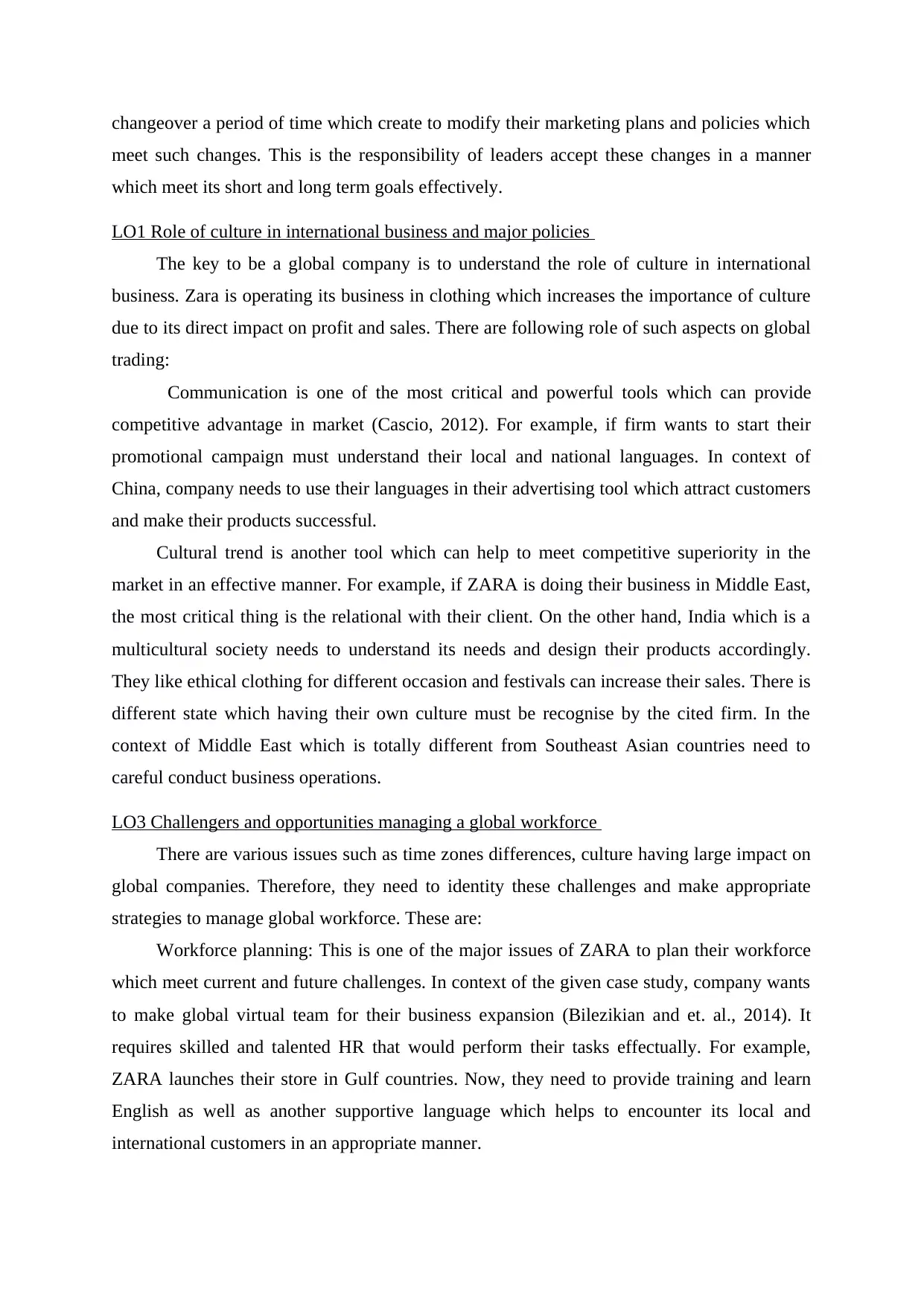
changeover a period of time which create to modify their marketing plans and policies which
meet such changes. This is the responsibility of leaders accept these changes in a manner
which meet its short and long term goals effectively.
LO1 Role of culture in international business and major policies
The key to be a global company is to understand the role of culture in international
business. Zara is operating its business in clothing which increases the importance of culture
due to its direct impact on profit and sales. There are following role of such aspects on global
trading:
Communication is one of the most critical and powerful tools which can provide
competitive advantage in market (Cascio, 2012). For example, if firm wants to start their
promotional campaign must understand their local and national languages. In context of
China, company needs to use their languages in their advertising tool which attract customers
and make their products successful.
Cultural trend is another tool which can help to meet competitive superiority in the
market in an effective manner. For example, if ZARA is doing their business in Middle East,
the most critical thing is the relational with their client. On the other hand, India which is a
multicultural society needs to understand its needs and design their products accordingly.
They like ethical clothing for different occasion and festivals can increase their sales. There is
different state which having their own culture must be recognise by the cited firm. In the
context of Middle East which is totally different from Southeast Asian countries need to
careful conduct business operations.
LO3 Challengers and opportunities managing a global workforce
There are various issues such as time zones differences, culture having large impact on
global companies. Therefore, they need to identity these challenges and make appropriate
strategies to manage global workforce. These are:
Workforce planning: This is one of the major issues of ZARA to plan their workforce
which meet current and future challenges. In context of the given case study, company wants
to make global virtual team for their business expansion (Bilezikian and et. al., 2014). It
requires skilled and talented HR that would perform their tasks effectually. For example,
ZARA launches their store in Gulf countries. Now, they need to provide training and learn
English as well as another supportive language which helps to encounter its local and
international customers in an appropriate manner.
meet such changes. This is the responsibility of leaders accept these changes in a manner
which meet its short and long term goals effectively.
LO1 Role of culture in international business and major policies
The key to be a global company is to understand the role of culture in international
business. Zara is operating its business in clothing which increases the importance of culture
due to its direct impact on profit and sales. There are following role of such aspects on global
trading:
Communication is one of the most critical and powerful tools which can provide
competitive advantage in market (Cascio, 2012). For example, if firm wants to start their
promotional campaign must understand their local and national languages. In context of
China, company needs to use their languages in their advertising tool which attract customers
and make their products successful.
Cultural trend is another tool which can help to meet competitive superiority in the
market in an effective manner. For example, if ZARA is doing their business in Middle East,
the most critical thing is the relational with their client. On the other hand, India which is a
multicultural society needs to understand its needs and design their products accordingly.
They like ethical clothing for different occasion and festivals can increase their sales. There is
different state which having their own culture must be recognise by the cited firm. In the
context of Middle East which is totally different from Southeast Asian countries need to
careful conduct business operations.
LO3 Challengers and opportunities managing a global workforce
There are various issues such as time zones differences, culture having large impact on
global companies. Therefore, they need to identity these challenges and make appropriate
strategies to manage global workforce. These are:
Workforce planning: This is one of the major issues of ZARA to plan their workforce
which meet current and future challenges. In context of the given case study, company wants
to make global virtual team for their business expansion (Bilezikian and et. al., 2014). It
requires skilled and talented HR that would perform their tasks effectually. For example,
ZARA launches their store in Gulf countries. Now, they need to provide training and learn
English as well as another supportive language which helps to encounter its local and
international customers in an appropriate manner.
Paraphrase This Document
Need a fresh take? Get an instant paraphrase of this document with our AI Paraphraser
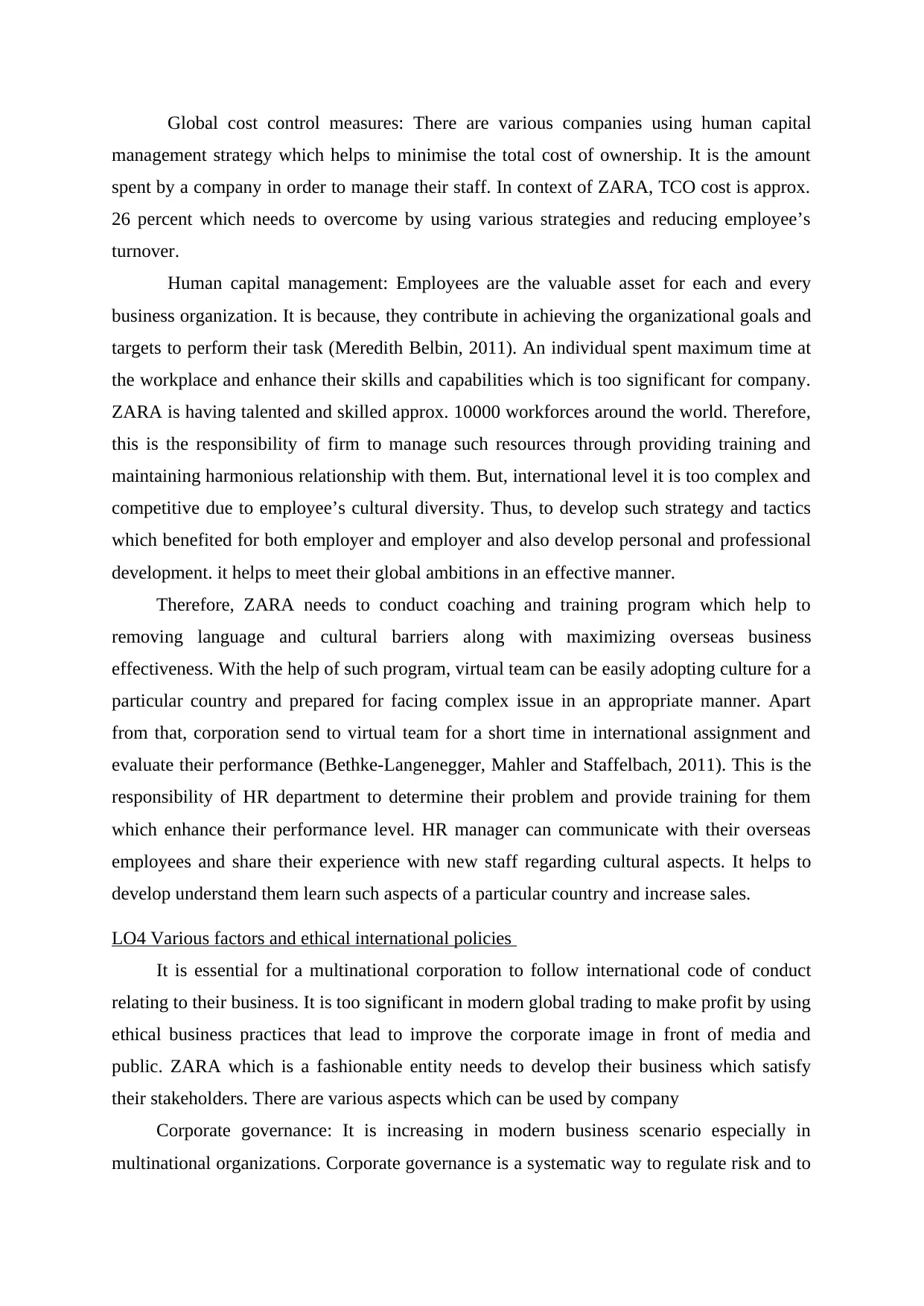
Global cost control measures: There are various companies using human capital
management strategy which helps to minimise the total cost of ownership. It is the amount
spent by a company in order to manage their staff. In context of ZARA, TCO cost is approx.
26 percent which needs to overcome by using various strategies and reducing employee’s
turnover.
Human capital management: Employees are the valuable asset for each and every
business organization. It is because, they contribute in achieving the organizational goals and
targets to perform their task (Meredith Belbin, 2011). An individual spent maximum time at
the workplace and enhance their skills and capabilities which is too significant for company.
ZARA is having talented and skilled approx. 10000 workforces around the world. Therefore,
this is the responsibility of firm to manage such resources through providing training and
maintaining harmonious relationship with them. But, international level it is too complex and
competitive due to employee’s cultural diversity. Thus, to develop such strategy and tactics
which benefited for both employer and employer and also develop personal and professional
development. it helps to meet their global ambitions in an effective manner.
Therefore, ZARA needs to conduct coaching and training program which help to
removing language and cultural barriers along with maximizing overseas business
effectiveness. With the help of such program, virtual team can be easily adopting culture for a
particular country and prepared for facing complex issue in an appropriate manner. Apart
from that, corporation send to virtual team for a short time in international assignment and
evaluate their performance (Bethke-Langenegger, Mahler and Staffelbach, 2011). This is the
responsibility of HR department to determine their problem and provide training for them
which enhance their performance level. HR manager can communicate with their overseas
employees and share their experience with new staff regarding cultural aspects. It helps to
develop understand them learn such aspects of a particular country and increase sales.
LO4 Various factors and ethical international policies
It is essential for a multinational corporation to follow international code of conduct
relating to their business. It is too significant in modern global trading to make profit by using
ethical business practices that lead to improve the corporate image in front of media and
public. ZARA which is a fashionable entity needs to develop their business which satisfy
their stakeholders. There are various aspects which can be used by company
Corporate governance: It is increasing in modern business scenario especially in
multinational organizations. Corporate governance is a systematic way to regulate risk and to
management strategy which helps to minimise the total cost of ownership. It is the amount
spent by a company in order to manage their staff. In context of ZARA, TCO cost is approx.
26 percent which needs to overcome by using various strategies and reducing employee’s
turnover.
Human capital management: Employees are the valuable asset for each and every
business organization. It is because, they contribute in achieving the organizational goals and
targets to perform their task (Meredith Belbin, 2011). An individual spent maximum time at
the workplace and enhance their skills and capabilities which is too significant for company.
ZARA is having talented and skilled approx. 10000 workforces around the world. Therefore,
this is the responsibility of firm to manage such resources through providing training and
maintaining harmonious relationship with them. But, international level it is too complex and
competitive due to employee’s cultural diversity. Thus, to develop such strategy and tactics
which benefited for both employer and employer and also develop personal and professional
development. it helps to meet their global ambitions in an effective manner.
Therefore, ZARA needs to conduct coaching and training program which help to
removing language and cultural barriers along with maximizing overseas business
effectiveness. With the help of such program, virtual team can be easily adopting culture for a
particular country and prepared for facing complex issue in an appropriate manner. Apart
from that, corporation send to virtual team for a short time in international assignment and
evaluate their performance (Bethke-Langenegger, Mahler and Staffelbach, 2011). This is the
responsibility of HR department to determine their problem and provide training for them
which enhance their performance level. HR manager can communicate with their overseas
employees and share their experience with new staff regarding cultural aspects. It helps to
develop understand them learn such aspects of a particular country and increase sales.
LO4 Various factors and ethical international policies
It is essential for a multinational corporation to follow international code of conduct
relating to their business. It is too significant in modern global trading to make profit by using
ethical business practices that lead to improve the corporate image in front of media and
public. ZARA which is a fashionable entity needs to develop their business which satisfy
their stakeholders. There are various aspects which can be used by company
Corporate governance: It is increasing in modern business scenario especially in
multinational organizations. Corporate governance is a systematic way to regulate risk and to
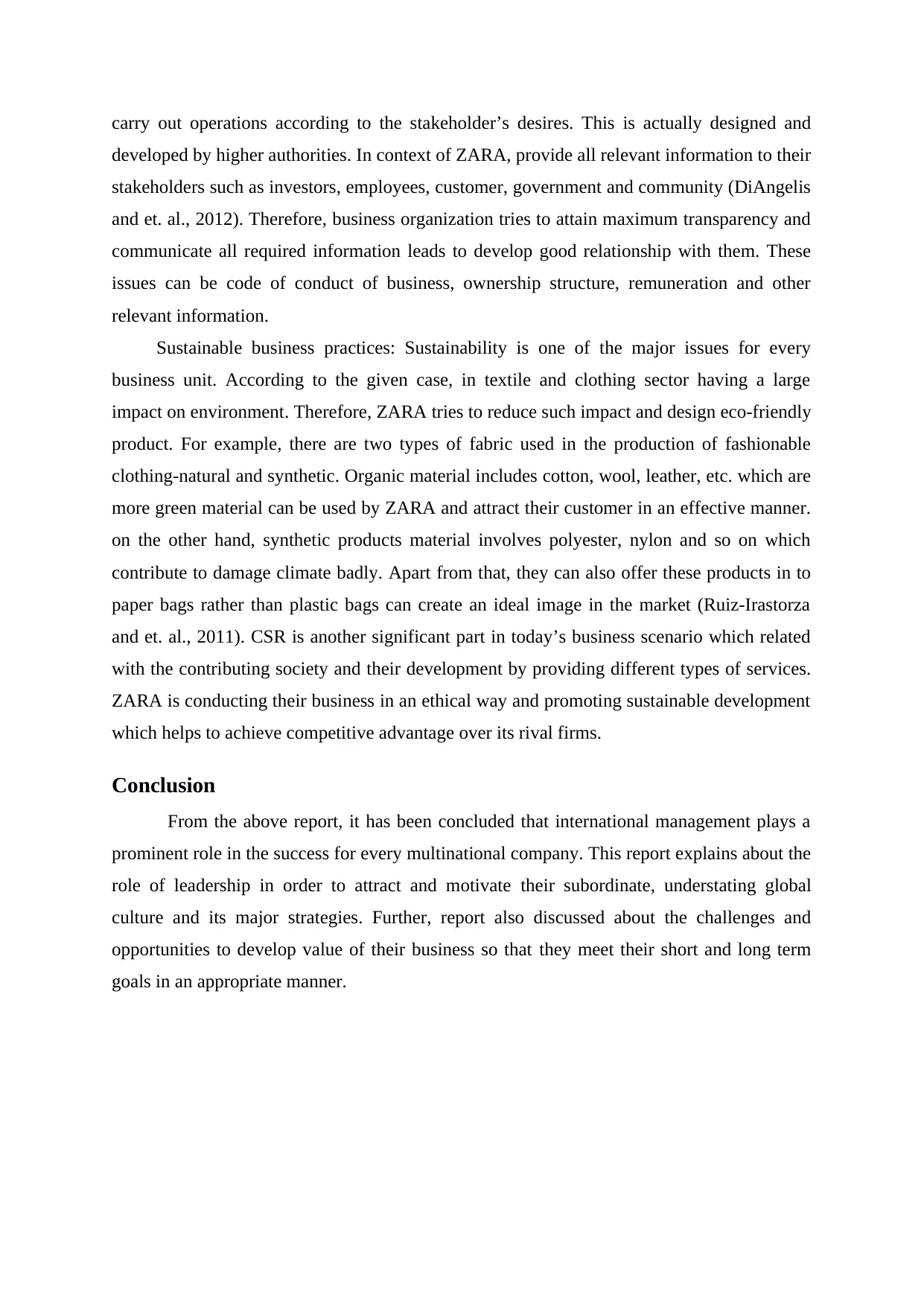
carry out operations according to the stakeholder’s desires. This is actually designed and
developed by higher authorities. In context of ZARA, provide all relevant information to their
stakeholders such as investors, employees, customer, government and community (DiAngelis
and et. al., 2012). Therefore, business organization tries to attain maximum transparency and
communicate all required information leads to develop good relationship with them. These
issues can be code of conduct of business, ownership structure, remuneration and other
relevant information.
Sustainable business practices: Sustainability is one of the major issues for every
business unit. According to the given case, in textile and clothing sector having a large
impact on environment. Therefore, ZARA tries to reduce such impact and design eco-friendly
product. For example, there are two types of fabric used in the production of fashionable
clothing-natural and synthetic. Organic material includes cotton, wool, leather, etc. which are
more green material can be used by ZARA and attract their customer in an effective manner.
on the other hand, synthetic products material involves polyester, nylon and so on which
contribute to damage climate badly. Apart from that, they can also offer these products in to
paper bags rather than plastic bags can create an ideal image in the market (Ruiz-Irastorza
and et. al., 2011). CSR is another significant part in today’s business scenario which related
with the contributing society and their development by providing different types of services.
ZARA is conducting their business in an ethical way and promoting sustainable development
which helps to achieve competitive advantage over its rival firms.
Conclusion
From the above report, it has been concluded that international management plays a
prominent role in the success for every multinational company. This report explains about the
role of leadership in order to attract and motivate their subordinate, understating global
culture and its major strategies. Further, report also discussed about the challenges and
opportunities to develop value of their business so that they meet their short and long term
goals in an appropriate manner.
developed by higher authorities. In context of ZARA, provide all relevant information to their
stakeholders such as investors, employees, customer, government and community (DiAngelis
and et. al., 2012). Therefore, business organization tries to attain maximum transparency and
communicate all required information leads to develop good relationship with them. These
issues can be code of conduct of business, ownership structure, remuneration and other
relevant information.
Sustainable business practices: Sustainability is one of the major issues for every
business unit. According to the given case, in textile and clothing sector having a large
impact on environment. Therefore, ZARA tries to reduce such impact and design eco-friendly
product. For example, there are two types of fabric used in the production of fashionable
clothing-natural and synthetic. Organic material includes cotton, wool, leather, etc. which are
more green material can be used by ZARA and attract their customer in an effective manner.
on the other hand, synthetic products material involves polyester, nylon and so on which
contribute to damage climate badly. Apart from that, they can also offer these products in to
paper bags rather than plastic bags can create an ideal image in the market (Ruiz-Irastorza
and et. al., 2011). CSR is another significant part in today’s business scenario which related
with the contributing society and their development by providing different types of services.
ZARA is conducting their business in an ethical way and promoting sustainable development
which helps to achieve competitive advantage over its rival firms.
Conclusion
From the above report, it has been concluded that international management plays a
prominent role in the success for every multinational company. This report explains about the
role of leadership in order to attract and motivate their subordinate, understating global
culture and its major strategies. Further, report also discussed about the challenges and
opportunities to develop value of their business so that they meet their short and long term
goals in an appropriate manner.
⊘ This is a preview!⊘
Do you want full access?
Subscribe today to unlock all pages.

Trusted by 1+ million students worldwide
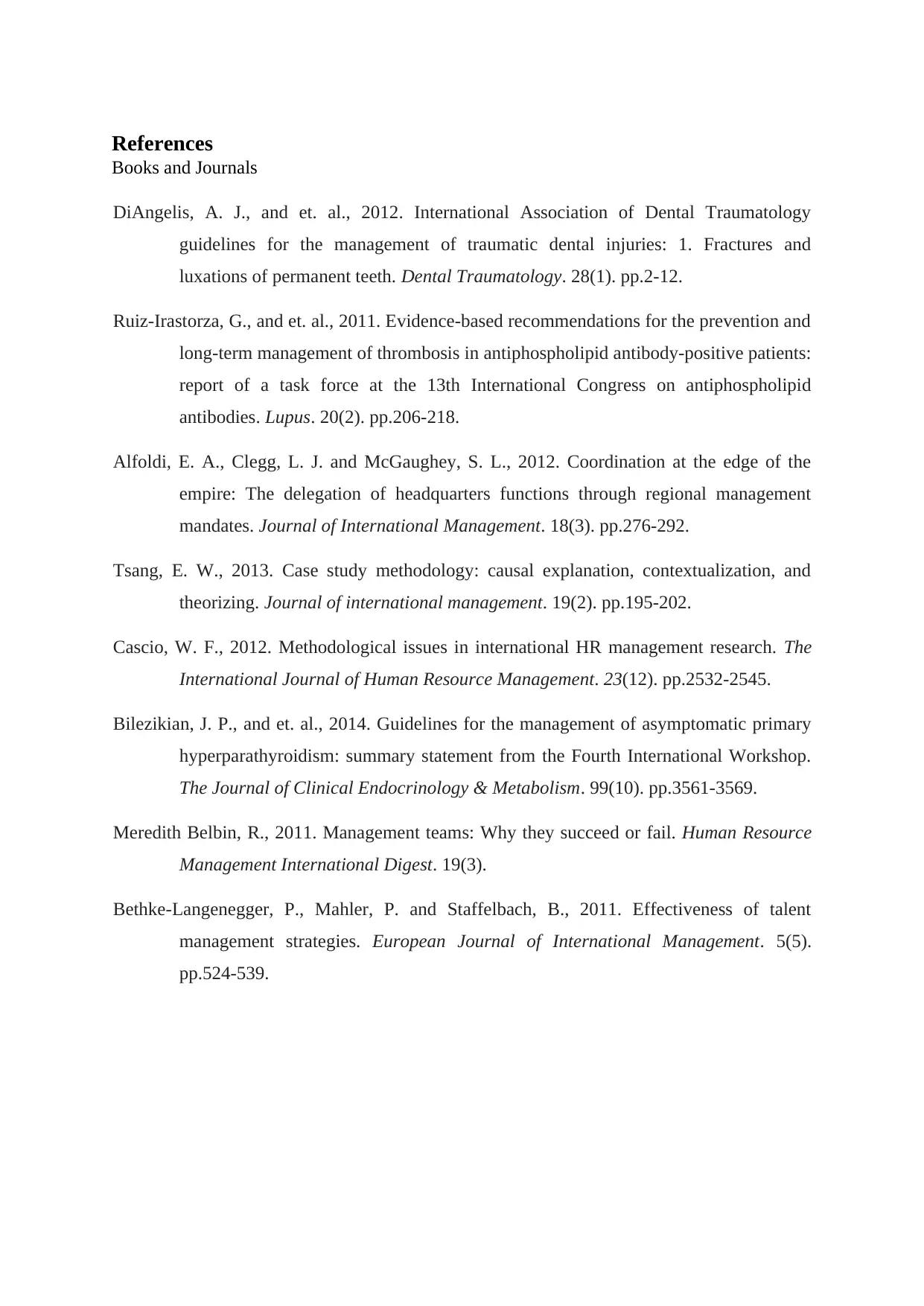
References
Books and Journals
DiAngelis, A. J., and et. al., 2012. International Association of Dental Traumatology
guidelines for the management of traumatic dental injuries: 1. Fractures and
luxations of permanent teeth. Dental Traumatology. 28(1). pp.2-12.
Ruiz-Irastorza, G., and et. al., 2011. Evidence-based recommendations for the prevention and
long-term management of thrombosis in antiphospholipid antibody-positive patients:
report of a task force at the 13th International Congress on antiphospholipid
antibodies. Lupus. 20(2). pp.206-218.
Alfoldi, E. A., Clegg, L. J. and McGaughey, S. L., 2012. Coordination at the edge of the
empire: The delegation of headquarters functions through regional management
mandates. Journal of International Management. 18(3). pp.276-292.
Tsang, E. W., 2013. Case study methodology: causal explanation, contextualization, and
theorizing. Journal of international management. 19(2). pp.195-202.
Cascio, W. F., 2012. Methodological issues in international HR management research. The
International Journal of Human Resource Management. 23(12). pp.2532-2545.
Bilezikian, J. P., and et. al., 2014. Guidelines for the management of asymptomatic primary
hyperparathyroidism: summary statement from the Fourth International Workshop.
The Journal of Clinical Endocrinology & Metabolism. 99(10). pp.3561-3569.
Meredith Belbin, R., 2011. Management teams: Why they succeed or fail. Human Resource
Management International Digest. 19(3).
Bethke-Langenegger, P., Mahler, P. and Staffelbach, B., 2011. Effectiveness of talent
management strategies. European Journal of International Management. 5(5).
pp.524-539.
Books and Journals
DiAngelis, A. J., and et. al., 2012. International Association of Dental Traumatology
guidelines for the management of traumatic dental injuries: 1. Fractures and
luxations of permanent teeth. Dental Traumatology. 28(1). pp.2-12.
Ruiz-Irastorza, G., and et. al., 2011. Evidence-based recommendations for the prevention and
long-term management of thrombosis in antiphospholipid antibody-positive patients:
report of a task force at the 13th International Congress on antiphospholipid
antibodies. Lupus. 20(2). pp.206-218.
Alfoldi, E. A., Clegg, L. J. and McGaughey, S. L., 2012. Coordination at the edge of the
empire: The delegation of headquarters functions through regional management
mandates. Journal of International Management. 18(3). pp.276-292.
Tsang, E. W., 2013. Case study methodology: causal explanation, contextualization, and
theorizing. Journal of international management. 19(2). pp.195-202.
Cascio, W. F., 2012. Methodological issues in international HR management research. The
International Journal of Human Resource Management. 23(12). pp.2532-2545.
Bilezikian, J. P., and et. al., 2014. Guidelines for the management of asymptomatic primary
hyperparathyroidism: summary statement from the Fourth International Workshop.
The Journal of Clinical Endocrinology & Metabolism. 99(10). pp.3561-3569.
Meredith Belbin, R., 2011. Management teams: Why they succeed or fail. Human Resource
Management International Digest. 19(3).
Bethke-Langenegger, P., Mahler, P. and Staffelbach, B., 2011. Effectiveness of talent
management strategies. European Journal of International Management. 5(5).
pp.524-539.
1 out of 7
Related Documents
Your All-in-One AI-Powered Toolkit for Academic Success.
+13062052269
info@desklib.com
Available 24*7 on WhatsApp / Email
![[object Object]](/_next/static/media/star-bottom.7253800d.svg)
Unlock your academic potential
Copyright © 2020–2026 A2Z Services. All Rights Reserved. Developed and managed by ZUCOL.





